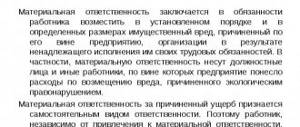You find out the most unpleasant news that an AUDITOR (auditor, or some other inspector) is coming to see you (or has arrived, or maybe has already visited you) and then here you are - get it, sign it - they charge you with a deficiency. Without the help of a lawyer, you can be left without a livelihood for the foreseeable future...
ATTENTION : our lawyer for the protection of employee rights will explain to you the provisions of the law on the payment of shortfalls, will help you prove your innocence if the shortfall is imposed after dismissal or during work: professionally, on favorable terms and on time. Call today!
Possible reasons for the shortage
There is an opinion that it is possible to find a shortage in the inventory process only when the seller or accountant is dishonest. In fact, this is a completely wrong opinion. The reasons why there is a shortage may be quite legitimate. Moreover, these are completely operational issues that every store faces, even if completely honest and conscientious people work there.
So, the most common answers to the question of why shortages occur:
- Natural decline. The phenomenon provided for by regulations when a material cannot be assessed “according to calculation”. For example, when selling loose cereals, it is simply impossible to sell every last gram. In any case, a smaller volume will pass through the checkout than was originally purchased.
- Defects arising during the sales process. Formally, it is also classified as the previous point, but it arises somewhat differently. Any product can be damaged (for example, clothes during the fitting process). It is not always the manufacturer’s fault and the item can be exchanged, but then it will need to be written off.
- Replacement of goods. In fact, this is the same misgrading, when instead of one product another was sold.
By the way, surplus is formally not a much less unpleasant phenomenon in accounting. In this case, the design can be even more problematic. Especially when it comes to excess cash in the cash register. In any case, an explanatory sheet will need to be drawn up, as in the case of a shortage of something.
Often, surpluses arise if there is misgrading. This phenomenon is characterized by the fact that similar goods were simply mixed together or another was sold instead of one. Then there should be more documentation of one product and less of the other.
The grocery store most often encounters this problem. A clear example: instead of one type of potato, the cashier punched another. The result is that one variety is documented to have been sold more than it actually was, and another - less, that is, there is actually not enough goods.
The procedure for registering shortages during inventory
Preparation of documentation is possible only after the final summing up of the inventory. To prepare a write-off act, you must also attach all documents (receipts, contracts and work reports) that confirm the costs indicated in the act.
If the amount of the shortage exceeds the permissible limit, then an internal investigation is carried out to identify the person responsible.
For some categories of goods, a similar procedure is not carried out - their manager, at his discretion, can write them off in “Expenses”.
If the usual rules for registering a shortage cannot be applied, then you will need to draw up an order to withhold the shortage from the culprit. This is possible if there is an obvious theft or if the permissible volumes of missing goods are exceeded. At the discretion of management, such an employee may be relieved of duties - transferred to another position or dismissed.
Supplier's wines
Sometimes a shortage can be discovered due to the fault of the supplier. There may be several factors here:
- less was shipped than stated according to the documents;
- the amount in containers (packs) is not what it should be;
- the boxes contain the wrong product (mis-graded).
Depending on what exactly has been identified, a further series of actions is determined. If there is a shortage of the actual quantity of products that should have been counted, then the responsibility falls on the person who accepted the delivery. In fact, the supplier has documents confirming acceptance of the goods without complaints. Therefore, it is impossible to present anything to him.
If the goods are not enough in the containers in which they were delivered, then the supplier may not admit guilt. Then an investigation must be carried out - possible theft during transportation (if a third-party organization was involved for this purpose). Also, the supplier can send a claim to the manufacturer if such a batch has already been received by him (if we talk about intermediaries). The same applies to cases when there was something wrong in the boxes.
In practice, this can be identified, but it is difficult to prove the supplier’s guilt and obtain compensation from him. The reason is that he can always refer to the deed of acceptance. If there were any complaints or discrepancies, this should have been stated at the very beginning, when accepting the goods. If the acceptance documents were signed, it means that there were no complaints and everything was in accordance with the supply agreement.
What is this shortage?
For many accountants, the term “shortfall” is a scary one. This is understandable, since this entails a number of negative consequences, penalties and penalties. In fact, almost always, even if the shortage is insignificant, it will be identified during the inventory process.
The shortage itself is a lack of funds, goods, and materials. In this case, absolutely all valuables must first be put on the balance sheet (included in accounting) in order to be able to strictly take into account their quantity.
The key is also to indicate their material value. The implication is that a person must know why a particular value has been withheld from him. By the way, the most interesting thing is the assessment of the cost of goods in stores.
If a certain amount of products is missing, then the person has the right to withhold the price that is stated according to the documents as retail.
The reason is that this amount is a loss for the store (lost profits are also taken into account). That is, it is not the purchase cost of the product that is taken into account.
Not always the shortage refers only to the value of the missing goods that were missing. If the product was broken or its shelf life had expired, then it is virtually impossible to sell it, so formally many attribute the cost also to the shortage. If, due to damage, the goods had to be sold at a reduced price, then the difference between the expected price and the income received is considered a shortage.
Theft by an employee
A gross violation of the current legislation, which entails criminal punishment. The main condition for establishing this fact is the presence of guilt. That is, theft is, in fact, theft committed at the workplace.
Important! If the amount of stolen money (or the monetary equivalent) does not exceed 2,500 rubles, then only administrative liability arises. If the amount is larger, then criminal prosecution is possible.
Management may impose the following types of liability for theft:
- collection of the amount;
- a reprimand entered into a personal file;
- dismissal.
The employer has the right to dismiss for such a violation with reference to paragraphs. "d" clause 6 of Art. 81 Labor Code of the Russian Federation. At the same time, the manager retains the right to demand compensation for damage caused. The boss can deduct the amount from the severance pay or go to court to recover the shortfall from the employee.
It should be taken into account that any employee can be held accountable, even if he is not a financially responsible person and stole something at the workplace, then such a violation still cannot be ignored. But the person who is documented to be responsible for the valuables will be responsible for the inventory results.
If, nevertheless, we are talking about theft by any other employee, then the employer retains the right to immediately contact law enforcement agencies after identifying the fact of the loss. Then a protocol is drawn up and liability arises in accordance with the Criminal Code, as in the case of theft in any other place (not at work).
Upon the fact of theft, a protocol must be drawn up that confirms the fact of the loss, and also documents the value clearly expressed in monetary terms. If we are talking about a monetary amount, then there are no problems with calculations. But if valuables are missing, then their book value is taken into account. In the event of loss of equipment or any long-term items, depreciation is additionally taken into account and only the final cost at the moment is indicated.
Prove innocence of shortage
What you should pay attention to first:
- You should know that if a month has already passed since the inspection, and you do not agree that you have been charged with a shortfall, and its amount significantly exceeds your average monthly salary, then the company management has the right to file a lawsuit, and this issue will be resolved there .
- If the above measures to establish the facts of the shortage on the part of management are not observed, then you have the right to appeal these actions in court.
If you agree with the results of the inspection, then the damage can be partially compensated voluntarily, while deferment of payment is allowed under the agreement that you draw up with the company management.
In the event that you are going to be fired after what happened, and you have already signed a document confirming your involvement in the shortage, but refuse to compensate for it, the employer has the right to sue you.
Your employer can file a claim against you in court within a year from the first day when they discovered a shortage at the enterprise.
- In the case where you are not involved in the shortage, but management blackmails you and forces you to pay for the damage caused to the organization, go to the police and write a statement about the employer’s abuse of its powers and fraud.
It would be advisable if you monitor the progress of the inspection yourself. Failure to comply with the conditions will only benefit you.
- The check should be carried out according to instruction No. 69.
- A commission of specially trained people is created.
- A specific document is drawn up upon the fact of the audit, in which the cashier or the person responsible for the goods must put a note that he agrees with the results of the audit.
The answer to the question: “how can one prove innocence of a shortage” is not easy. In any case, if you think that you are not guilty, write a statement to the police, they are obliged to look into this matter.
You have the right to prove your innocence in court, and you can even win the trial - for this you need to draw up a statement using the services of your lawyer.
Natural attrition process
This process is specifically provided for at the legislative level. Not all goods can be sold in full without losses. For example, if we are talking about food products or materials for sewing things. It is impossible to realize or use all the material resources without any remainder. During storage, some may deteriorate. Doing anything to find the culprits in this case is illogical. That is why the legal source regulating this issue clearly highlights the process of natural attrition. This is a phenomenon when a decrease in the balance quantity of goods is quite acceptable and logical.
The size and monetary equivalent of natural loss for various groups of goods is clearly regulated. The employer cannot independently change these values at his own discretion. If the size of the shortage exceeds them, then it is necessary to identify the reasons and look for those responsible in order to then make deductions.
However, this is not provided for all values and not always. For example, a storekeeper cannot demand the write-off of goods stored in a warehouse.
By the way, documentation is also a commodity and material resource that has a clear monetary value. In case of shortage, everything will need to be arranged in the same way. For example, if we are talking about work records. And it is precisely this kind of value that the concept of natural decline will not apply to.
When an employee cannot be blamed for a shortage
You should also know that there are certain situations when an employee cannot be blamed for the damage caused:
- when exposed to force majeure;
- in case of emergency;
- if the damage was caused in case of self-defense;
- failure to comply with proper rules for the storage of material assets by immediate management.
If you find yourself in an unpleasant situation, do not panic under any circumstances. Every effort must be made to resolve this issue.
At any time, you can seek help from law enforcement agencies or hire a lawyer who will competently help you solve the problem that has arisen.
There can be no unsolvable situations; if you are completely confident that you are not involved in the shortage, be sure to try to prove that you are right and do not succumb to blackmail and threats from superior employees and management. No matter how hopeless the situation may seem to you, you always need to go to the end, defending your honor and rights.
Inventory procedure
Inventory can be planned or unplanned. Planned inventory is carried out according to the schedule approved in each organization. An unscheduled appointment is assigned if there are significant reasons for this:
- transfer of cases by a financially responsible person;
- theft, a natural disaster during which a warehouse, store or any other storage facility is damaged;
- identification of any facts that may cast doubt on the reliability of the financially responsible person.
It is necessary to issue an order in advance for the upcoming inventory, which clearly indicates the start and end dates, responsible persons and the reason.
Based on the results, a report is drawn up indicating the information received. Depending on this, further orders are issued (on collecting the deficiency, on issuing a reprimand).
What should an employer do?
If a shortage of goods or funds is detected in the store, you must:
- Draw up a deficiency report in two copies, with an exact indication of the name of the product, quantity and amount. The acts must be certified by the signature of the responsible persons and the accountable sales employee.
- The financially responsible person is obliged to draw up an explanatory note addressed to the manager, indicating the reason for the lack of goods or cash.
The employer can decide on measures of influence and punishment independently, except for the presence of malicious intent and a high degree of guilt.
Documentation
The documentary aspect plays a key role here. Any identified result must initially be documented. Often, if the volumes of valuables are not too large, a special reconciliation act is created, which indicates a complete list of things on the balance sheet. Further, they note what actually exists.
If the volumes are too large, then the discrepancies simply need to be entered into the act. After this, orders will be issued on how to punish the perpetrators. In this case, it is necessary to prepare documents confirming compliance with all preventive measures. For example, if a storekeeper proves that the warehouse is not provided with adequate protection from thieves, then it will be difficult to accuse him of anything.
If the amount of natural loss allowed for write-off is not exceeded, then an additional act of writing off the shortage is drawn up.
Shortage investigation
If a shortage is identified, an investigation must be carried out in any case, regardless of the reasons and amount.
Employee's explanations
The first thing the commission does during an investigation is to ask for an explanation from the person responsible.
Explanations are written in free form. They will contain the following details and data:
- Full name and position of the employer in whose name the explanations are written.
- Full name and position of the employee giving the explanation.
- Consistent and detailed presentation of the reasons for the identified shortage.
- Date and signature.
In addition, the employee has the right to familiarize himself with all documents drawn up by the commission that carried out the inventory.
To provide explanations for the fact of a shortage, the period provided for in the Labor Code of the Russian Federation for all cases of official investigations is used. It is two days.
The period begins to run the day after the employee is asked for an explanation.
In order to prevent the employee from later saying that he was not asked for an explanation and, accordingly, the investigation procedure was violated, this must be done in writing and handed to the employee against signature. If he refuses to accept the request for an explanation and, accordingly, to sign for it, then in the presence of the commission the document is read out loud to him and an act of refusal to receive the demand is drawn up.
Drawing up this act cannot be equated with a refusal to give explanations; the employee still needs to be given two days.
Order on inventory results
Management reviews the employee’s explanation and all the facts provided and makes a decision on the degree of guilt of the employee, as well as what to do with the shortfall amounts.
Then an order is issued containing information about the results of the investigation, the reasons for the shortage and methods for compensating it (writing it off).
Also, in the case where the employee responsible for the safety of valuables is to blame for the shortage, disciplinary action may be imposed on him.
It is better to do this by a separate order, especially if the result of identifying a shortage was a loss of confidence in the financially responsible person and his dismissal.
The order is drawn up in free form, on the organization’s letterhead. It must contain all the details of the administrative document:
- The name of the organization in which it was published.
- Date and document number.
- An introductory part (preamble), which sets out the identified shortcomings and their reasons.
- The content part, where orders are given to punish the guilty persons and eliminate the identified shortcomings, in this case the procedure for compensating the shortfall.
- Manager's signature.
The organization's seal is not provided on the order.
The issued order must be familiarized to the employee within three days.
General procedure for the employer
If a shortage is identified during the inventory, then the manager’s main task is to process and document everything correctly. If assistance from law enforcement agencies is required, then it is necessary to contact them as quickly as possible. Most often this happens if the shortage is a consequence of illegal actions of employees.
Next, depending on the situation, a decision is made on further actions: whether the shortage will be written off or whether it will need to be withheld from the guilty person, having previously identified him.
If the manager initiates the dismissal of an employee, then there is no need to wait the required 2 weeks (they only apply to leaving the company at will). You can fire someone even by issuing an order on the day of reviewing the results of the inventory. By the way, there are no restrictions here - the manager can fire any employee for such a gross violation.
Shortage in the store: what should the seller do?
To begin with, it should be noted that the consequences of such an unpleasant situation as a shortage for sellers primarily depend on the preparation of basic documentation. This should include an inventory act (report) and an agreement on collective responsibility in material terms. It is very important whether the accused employee has the opportunity to prove his own innocence in the situation that caused the shortage in the store (criminal liability awaits him otherwise). In addition, the fact that the employee has proven the presence of certain violations on the part of the employer will be a great advantage. Among them may be defective conditions accompanying the work process, or non-compliance with rules regarding the safety of entrusted valuables.
Recovery from the guilty persons
After everything is correctly documented, the manager transfers the documents to the accounting department.
The solution to the issue of collecting money from an employee is regulated by Article 248 of the Labor Code of the Russian Federation. It is possible to recover the due amount at the request of the employee, who, on the basis of an order to return the missing amount in writing, requests a deduction from his salary (or simply deposits funds into the specified account).
If the employee objects to the deduction from wages, then it is possible to make a recovery based on a court decision. With this option, according to the writ of execution, up to 50 percent of the total amount of his income will be deducted.
If, by a court decision, the employee refuses to pay and at the same time quits (the employer still has no right to deny this right), then deductions based on the writ of execution can be made from other types of his income.
They can also be imprisoned if the damage was caused on a particularly large scale and the theft is proven.
How is the amount of the deficiency recovered from the culprit?
Even if there is a shortage, they can collect something without the employee’s consent, subject to the following conditions:
- Less than a month has passed since the shortage was discovered;
- The amount of damage does not exceed 1 average salary;
- An agreement on full financial responsibility has been concluded with the employee.
If any of the points are violated, retention without the employee’s consent is illegal.
The monthly amount deducted from the salary of an employee found guilty cannot be more than 20%.
To recover the shortfall in the amount of average earnings, an order must be issued from the head of the company, to which he is introduced upon signature. If the collection deadline is missed, or the amount of the shortfall exceeds the average earnings, the employer may try to negotiate with the employee about repayment on a voluntary basis, or file a lawsuit.
Arbitrage practice
This example demonstrates that the manager may not deduct the shortfall from wages on his own.
In this case, the employee was simply issued an official demand for repayment of the debt. The employee agreed with the management's decision, but did not contribute any amount. Then the manager went to court to demand not only the amount of debt, but also interest for the entire period of non-repayment. The decision was satisfied in full. Based on the resolution, the collection will be carried out by state bodies. Decision of October 3, 2021 in case No. 2-1549/2017







